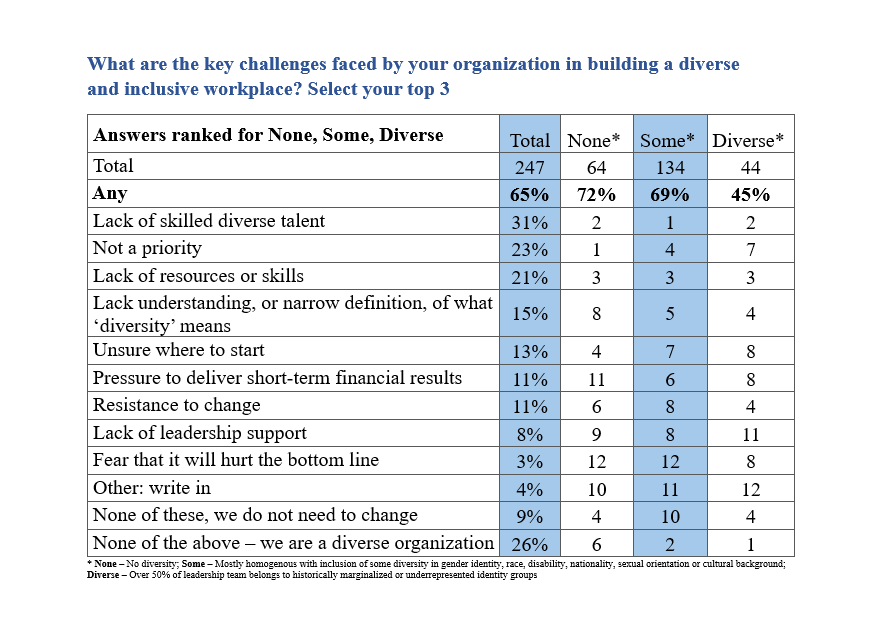Who says diverse candidates don’t want to be brokers?

A large majority (81%) of brokers believe it’s a myth that there’s a lack of diverse talent available to hire or promote. Yet, when asked about key hiring challenges facing their organizations, lack of skilled diverse talent tops the list, according to Canadian Underwriter’s 2024 Brokerage DEI survey.
According to 291 broker respondents, the top factors responsible for this myth include:
Unconscious bias or stereotypes (27%)
Limited exposure to diversity overall (21%)
Insufficient diversity representation in leadership (20%)
That said, a full 19% of brokers firmly believe there really is a lack of skilled diverse talent, according to the survey made possible with the support of Sovereign Insurance.
When asked which factors perpetuate the view that talent is scarce, several brokers note diverse hiring can only go as far as a brokerage’s geography. “Our business is in a remote area. Diverse talent is somewhat limited,” says one Ontario-based broker-owner. “Not a lot of diversity in our community,” adds a rural Alberta broker.
But some emphasize it may not be a paucity of skill that’s preventing the hiring of diverse candidates, but rather the industry’s limited appeal.
“There is a lack of active recruitment in the industry as a whole, so this has an impact on bringing diversity into the industry also,” says one Ontario-based respondent.
“Insurance is a hard and an underrated profession — not a lot of people say, ‘I want to be an insurance broker when I grow up,’” says another respondent.
When asked about key challenges facing organizations looking to build diverse workplaces, 31% of respondents identified ‘lack of skilled diverse talent’ as their top answer.
This was followed by ‘not a priority’ (23%), and ‘lack of resources or skills’ (21%), as the second and third top challenges by brokerages with all levels of diversity in senior leadership.

Two-thirds (65%) of brokers working at organizations not leading in diversity say they’re experiencing challenges building a diverse and inclusive workplaces. This is down from last year (70%) but in line with 2022 (64%).
“There may be a lack of diversity in leadership but I suspect it’s because of a lack of qualified candidates,” says one Gen-X broker owner in Ontario.
“Not enough skilled, diverse people in the industry,” one personal lines insurance advisor in western Canada says.
Diversity aside, some brokers say they simply have problems procuring talent.
“Our organization is more than open to diversity, and we do have some diverse group employees on staff (not in the management roles). The issue is finding the talent in general in our industry,” says one broker.
Another broker in a western Canada city says: “Hard to find employees who are interested in this field as a career.”
But when asked which specific actions their organizations take to increase diversity, top results include:
Leadership actively supporting DEI initiatives (40%)
Increased focus on hiring diverse talent (36%)
Company publicly promotes its DEI values, priorities and commitments (35%)
Those working at brokerages with no diversity in senior leadership were less likely to flag specific measures taken to increase diversity.
“No strategies,” says one western broker with no diversity at their firm; “None,” adds another.
“Our brokerage hasn’t yet been put in a position where things need to be implemented,” says one broker at a firm with some diversity.
When asked if their organization has a budget allocation for DEI, only 20% responded affirmatively. Another 45% are not sure. And those who work in brokerages with no diversity in senior leadership are more (48%) likely to say there is no budget for DEI whatsoever.
“Computer training is mandatory on diversity,” says one respondent, who specifies their brokerage is using some budget from another source.
“We do not specify HR budget at all, rather allocate funds as necessary for training [and] development,” says an owner of a brokerage with no diversity.
“There is little or no cost to our initiatives and our training provisions are free,” says another respondent.
Feature image by iStock.com/tadamichi







